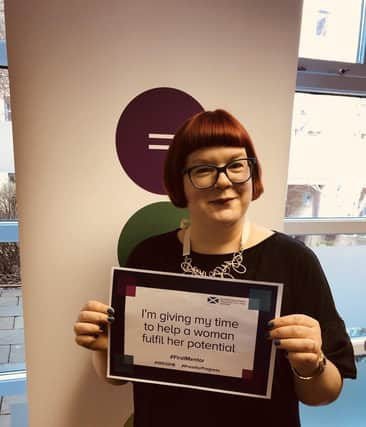Coronavirus: Women need more financial support claims new report


A new report by Engender, a Scottish feminist organisation, has analysed data from the Institute of Fiscal Studies on the economic impact of coronavirus on women.
It found that those with children had been forced to cut their paid hours, on average by two hours a day, amounting to a daily loss of £33. If replicated across the UK would amount to a daily loss of £188.5 million to the economy and according to Engender a cost of £15m to the Scottish economy.
Advertisement
Hide AdAdvertisement
Hide AdThe report says that the “incompatibility of paid work and home-schooling or childcare has seen mothers withdraw from paid work” and points to statistics showing that while mothers worked an average of 73 per cent of the hours worked by fathers pre-Covid, this has fallen to 68 per cent.
Further, the UK-wide charity Turn2Us estimates that women have experienced a 26 per cent loss of earnings compared with 18 per cent for men during the pandemic, and the IFS also revealed that mothers were already 1.5 times more likely than fathers to have lost their jobs or to have quit their jobs over lockdown.
The report states: “The response to Covid-19 has seen a significant displacement of care and childcare from services to households throughout lockdown. Despite descriptions of crashing productivity in the ‘real economy,’ women are busier than ever. Time-use data, survey data, and women’s own accounts all chart an increase in home-schooling, childcare, care for disabled and older people, and other unpaid work predominantly done by women such as housework and household management.
“The only policy response to this increase in unpaid work has been an ill-fitting ‘furlough’ scheme, which initially did not include any provision for employers to secure wage replacement for those doing caring roles. Although the UK Government’s Job Retention Scheme has now been expanded to include furlough for those providing childcare or care full-time, this is not available on a part-time basis. Women who are in paid work are consequently juggling their employment and these larger care roles,with significant consequences for their wellbeing and mental health.”
It adds: “To avoid a rollback of women’s equality and rights as Scotland emerges from lockdown, Scottish Government and other public bodies must consider the role of unpaid care as they plan the ways in which economic recovery and the safe delivery of transport, education, childcare, and other public services will be achieved.”
As a result the report recommends the Scottish and UK governments “work up options” to ensure women unable to combine paid work and childcare because of the pandemic can still receive an income "for as long as needed”, suggesting the scheme could be based on elements of the furlough scheme, carers leave or shared parental leave. It also asks for a new payment, equivalent to the real living wage, for unpaid carers for disabled people and older people.
Emma Ritch, Engender’s executive director said: “This crisis has highlighted just how much unpaid work is done by women in Scotland. Care, childcare, and housework are all vital to keep society functioning, but are completely undervalued or ignored, as exemplified by the UK government’s furlough scheme which initially didn’t even recognise that caring responsibilities might have an impact on someone’s ability or desire to work from home.
"As we move from the initial crisis response into post-Covid recovery plans, the Scottish Government must ensure that women’s unpaid work does not or entrench inequality. We are calling for consideration of bold but deliverable measures to increase women’s incomes including substantial investment in the caring economy, a social security system which recognises the realities of carers’ lives, and schemes such as an extended furlough period to allow women to effectively balance their paid and unpaid work.”
Advertisement
Hide AdAdvertisement
Hide AdThe Scottish Government said it was “committed to produce rigorous analysis on women’s position in the labour market in light of the pandemic” and that it would “fully consider” the recommendations made in a recent report on the labour market impacts of Covid-19 for different groups of people, including women.
A message from the Editor:Thank you for reading this story on our website. While I have your attention, I also have an important request to make of you.With the coronavirus lockdown having a major impact on many of our advertisers - and consequently the revenue we receive - we are more reliant than ever on you taking out a digital subscription.Subscribe to scotsman.com and enjoy unlimited access to Scottish news and information online and on our app. With a digital subscription, you can read more than 5 articles, see fewer ads, enjoy faster load times, and get access to exclusive newsletters and content. Visit https://www.scotsman.com/subscriptions now to sign up.
Our journalism costs money and we rely on advertising, print and digital revenues to help to support them. By supporting us, we are able to support you in providing trusted, fact-checked content for this website.
Joy Yates
Editorial Director
Comments
Want to join the conversation? Please or to comment on this article.